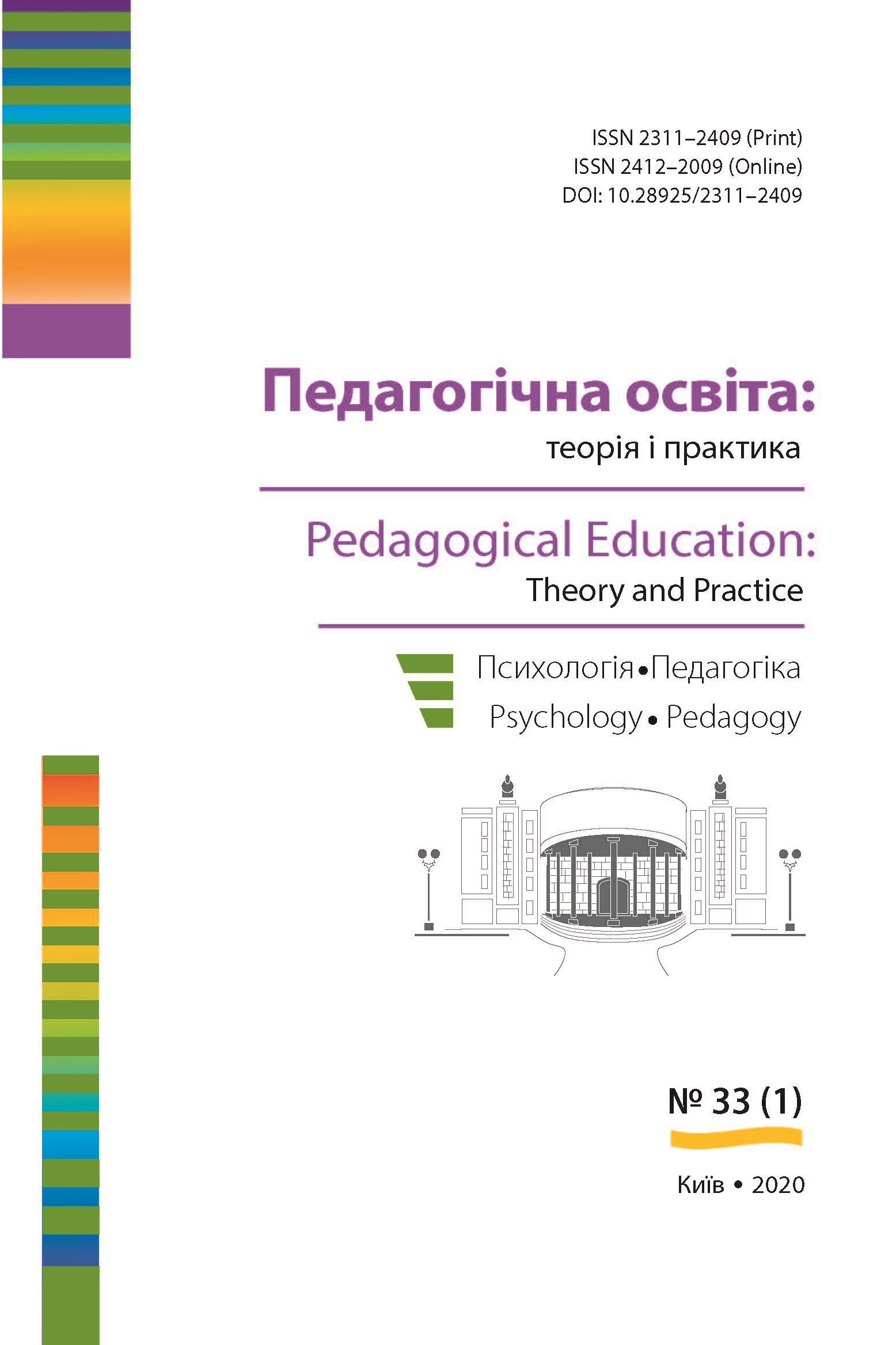THE REFLEXIVE COMPETENCE OF A FUTURE TEACHER: ESSENCE, STRUCTURE, LOGIC OF REFLEXIOGENESIS
DOI:
https://doi.org/10.28925/2311-2409.2020.33.2Abstract
The article analyzes the reflective paradigm of education as a promising strategy for Ukrainian higher education reforming. Its mission, purpose, objectives, content, functions and criteria are disclosed. Proved the priorities of the reflexive education paradigm related to the reflexive competence formation of the personality, represented by a set of components, adequate to reflective activity. The structure of reflexive competence which contains motivational-value (motives, needs, personal interest, desire, tendency to engage in reflexive activity, approach to pedagogical reflection as a value); cognitive (system of reflexive knowledge, which is the theoretical basis of reflective competence and represent a system of concepts and ideas associated with self-knowledge, self-awareness, understanding and perception of the individual student, interaction with students); operational-activity (system of reflexive skills connected with self-knowledge and understanding of another, with self-assessment and evaluation of other people, with self-interpretation and interpretation of another, with analysis and development of pedagogical technologies) components, was grounded on the basis of structural-activity trait and types of reflection. According to the structure of reflexive competence, the criteria of its formation are defined (stimulating-axiological, cognitive, praxeological). Adjusted diagnostic toolkit containing standardized and proprietary methods. The genesis of the reflective competence of future teachers in the period of vocational training in higher education is revealed. The concept of “reflexiogenesis” as a process of gradual development of reflexive competence components in the direction of their complication and extension of the range of realization of different types of pedagogical reflection synthesized in contextual reflection is introduced into scientific circulation. Proved that the initial stage of formation of reflective competence (the first course of study at a higher education institution) associated with the formation of reflection not as a professional quality, but as a basic personal education; with in the next step (the second, the thirdcourse of study at a higher education institution), there is a formation of pedagogical reflection as a professional-personal quality of the teacher; in the process of educational and professional activity (the fourthcourse of study at a higher education institution) the formation of reflexive competence as a holistic, integrated professional-personal quality of the future teacher.
Key words: reflexive paradigm of education, reflection, pedagogical reflection, types of reflection, reflexive competence, reflexiogenesis.
Downloads
References
Деркач А.А. Акмеологические основы развития профессионала. М.: Изд-во Моск. психол.-социал. ин-та; Воронеж: МОДЭК. 2004. 752 с.
Ерошенкова Е.И. Формирование профессионально-ценностной установки будущего учителя в деятельности куратора студенческой группы : дис. ... канд. пед. наук : 13.00.08. Белгород, 2008, 224 с.: ил.
Желанова В.В.Таксономія типів професійної рефлексії педагога: міждисциплінарний контекст.Педагогічна освіта: теорія і практика. Психологія. Педагогіка. Збірник наукових праць. Вип. 27. Київ, 2017. С. 9—14.
Заброцький М.М. Педагогічна психологія: курс лекцій. К.: МАУП, 2002. 100 с.
Леонтьев А.Н. Деятельность. Сознание. Личность. М.: Политиздат, 1977. 304 с.
Лозенко А.П. Формування рефлексивних умінь у майбутніх учителів початкової школи в процесі дидактичної підготовки : автореф. дис. на здобуття наук. ступеня канд. пед. наук : спец. 13.00.09 «Теорія навчання». К., 2010. 23 с. : рис., табл.
Семенов И.Н., С.Ю. Степанов Рефлексия и организация творческого мышления и саморазвитии личности. Вопр. психологии. 1983. № 2. С. 35—42.
Степанов С.Ю. Акмеологические парадоксы. Акмеология. 1997. № 1. С. 11—17.
Ульяніч І.В. Психологічні умови формування рефлексивної компетентності вчителів-початківців : дис. … канд. психол. наук: 19.00.07. Слов’янськ, 2011. 219 с.
Холодная М.А. Психология интеллекта: парадоксы исслед. 2-е изд., перераб. и доп. СПб.: Питер, 2002, 544 с.
Grant T.C. Preparing for reflective teaching. Boston, 1984. P. 85.
Kirby P. Development of the reflective teaching instrument. Journal of research & development in Education. 1989. v. 22. № 4. P. 45—50.
REFERENCES
Derkach, A. (2004) Akmeologicheskiye osnovy razvitiya professionala. [Acmeological foundations of professional development.]. M.: Izd-vo Mosk. psikhol.-sotsial. instituta; Voronezh: MODEK, 752 s. (in Russian)
Eroshenkova, E. (2008) Formirovaniye professional’no-tsennostnoy ustanovki budushchego uchitelya v deyatel’nosti kuratora studencheskoy gruppy [The formation of the professional-value attitude of the future teacher in the activities of the curator of the student group] dis. kand. ped. nauk : 13.00.08. Belgorod, 224 s. (in Russian)
Zhelanova, V. (2017) Taksonomiya typiv profesiynoyi refleksiyi pedahoha: mizhdystsyplinarnyy kontekst. [Taxonomy of types of teacher’s professional reflection: an interdisciplinary context] Pedahohichna osvita: teoriya i praktyka. Psykholohiya. Pedahohika. Zbirnyk naukovykh prats. № 27. Kyiv,s. 9—14.(in Ukrainian)
Zabrotsky, M. (2002) Pedahohichna psykholohiya: kurs lektsiy [Pedagogical psychology]. K.: MAUP, 100 s. (in Ukrainian)
Leont’yev A. (1977) Deyatel’nost’. Soznaniye. Lichnost’ [Activity. Consciousness. Personality]. M.: Politizdat, 304 s. (in Russian)
Lozenko, A. (2010). Formuvannia refleksyvnykh umin u maibutnikh uchyteliv pochatkovoi shkoly v protsesi dydaktychnoi pidhotovky: avtoref. dys. na zdobuttia nauk. stupenia kand. ped. nauk [Formation of reflexive skills in future primary school teachers in the process of didactic preparation: Abstract for a thesis of a Candidate of Pedagogical Sciences]. Kyiv, 23 s. (in Ukrainian)
Semenov, I., Stepanov, S . (1983). Refleksiya i organizaciya tvorcheskogo myshleniya i samorazvitii lichnosti [Reflection and organization of creative thinking and personal self-development ]. Voprosy psihologii. № 2. S. 35—42 (in Russian)
Stepanov, S. (1997). Akmeologicheskie paradoksy [Acmeological paradoxes]. Akmeologiya. № 1.
S 11—17. (in Russian)
Ul’yanіch, І. (2011). Psihologіchnі umovi formuvannya refleksivnoї kompetentnostі vchitelіv-pochatkіvcіv: dis kand. psihol. nauk [Psychological conditions for the formation of reflexive competence of beginning teachers: Thesis of a Candidate of Psychological Sciences]. Slovyansk, 219 s. (in Ukrainian)
Holodnaya, M. (2002). Psihologiya intellekta: paradoksy issledovaniya. [Psychology of Intelligence: Research Paradoxes]. SPb.: Piter, 544 s. (in Russian)
Grant, T.C. Preparing for reflective teaching. Boston, 1984. P. 85 (in English)
Kirby, P. Development of the reflective teaching instrument. Journal of research & development in Education. 1989. v. 22. №4. P. 45—50 (in English)

